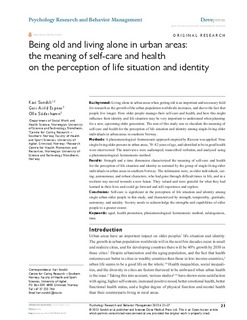Being old and living alone in urban areas. The meaning of self-care and health on the perception of life situation and identity
| dc.contributor.author | Sundsli, Kari | |
| dc.contributor.author | Espnes, Geir Arild | |
| dc.contributor.author | Söderhamn, Olle | |
| dc.date.accessioned | 2015-06-10T08:07:45Z | |
| dc.date.accessioned | 2015-06-11T12:22:01Z | |
| dc.date.available | 2015-06-10T08:07:45Z | |
| dc.date.available | 2015-06-11T12:22:01Z | |
| dc.date.issued | 2013 | |
| dc.identifier.citation | Psychology Research and Behavior Management 2013, 6:21-27 | nb_NO |
| dc.identifier.issn | 1179-1578 | |
| dc.identifier.uri | http://hdl.handle.net/11250/284922 | |
| dc.description | - Published article -cc-by-nc | nb_NO |
| dc.description.abstract | Background: Living alone in urban areas when getting old is an important and necessary field for research as the growth of the urban population worldwide increases, and due to the fact that people live longer. How older people manage their self-care and health, and how this might influence their identity and life situation may be very important to understand when planning for a new, upcoming older generation. The aim of this study was to elucidate the meaning of self-care and health for the perception of life situation and identity among single-living older individuals in urban areas in southern Norway. Methods: A phenomenological–hermeneutic approach inspired by Ricoeur was applied. Nine single-living older persons in urban areas, 70–82 years of age, and identified to be in good health were interviewed. The interviews were audiotaped, transcribed verbatim, and analyzed using a phenomenological–hermeneutic method. Results: Strength and a time dimension characterized the meaning of self-care and health for the perception of life situation and identity as narrated by the group of single-living older individuals in urban areas in southern Norway. The informants were, as older individuals, car- ing, autonomous, and robust characters, who had gone through difficult times in life, and in a resilient way moved towards a new future. They valued and were grateful for what they had learned in their lives and could go forward and still experience and explore. Conclusion: Self-care is significant in the perception of life situation and identity among single urban older people in this study, and characterized by strength, temporality, gratitude, autonomy, and natality. Society needs to acknowledge the strengths and capabilities of older people to a greater extent. Keywords: aged, health promotion, phenomenological–hermeneutic method, salutogenesis, time | nb_NO |
| dc.language.iso | eng | nb_NO |
| dc.publisher | Dove Medical Press | nb_NO |
| dc.relation.uri | http://www.dovepress.com/articles.php?article_id=13394 | |
| dc.title | Being old and living alone in urban areas. The meaning of self-care and health on the perception of life situation and identity | nb_NO |
| dc.type | Journal article | nb_NO |
| dc.type | Peer reviewed | en_GB |
| dc.date.updated | 2015-06-10T08:07:45Z | |
| dc.source.pagenumber | 21-27 | nb_NO |
| dc.source.volume | 6 | nb_NO |
| dc.source.journal | Psychology Research and Behavior Management | nb_NO |
| dc.identifier.doi | 10.2147/PRBM.S46329 | |
| dc.identifier.cristin | 1035149 | |
| dc.description.localcode | This work is published by Dove Medical Press Limited, and licensed under Creative Commons Attribution - Non Commercial (unported, v3.0) License. The full terms of the License are available at http://creativecommons.org/licenses/by-nc/3.0/. Non-commercial uses of the work are permitted without any further permission from Dove Medical Press Limited, provided the work is properly attributed. Permissions beyond the scope of the License are administered by Dove Medical Press Limited. Information on how to request permission may be found at: http://www.dovepress.com/permissions.php | nb_NO |
Files in this item
This item appears in the following Collection(s)
-
Institutt for sosialt arbeid [1367]
-
Publikasjoner fra CRIStin - NTNU [38046]
